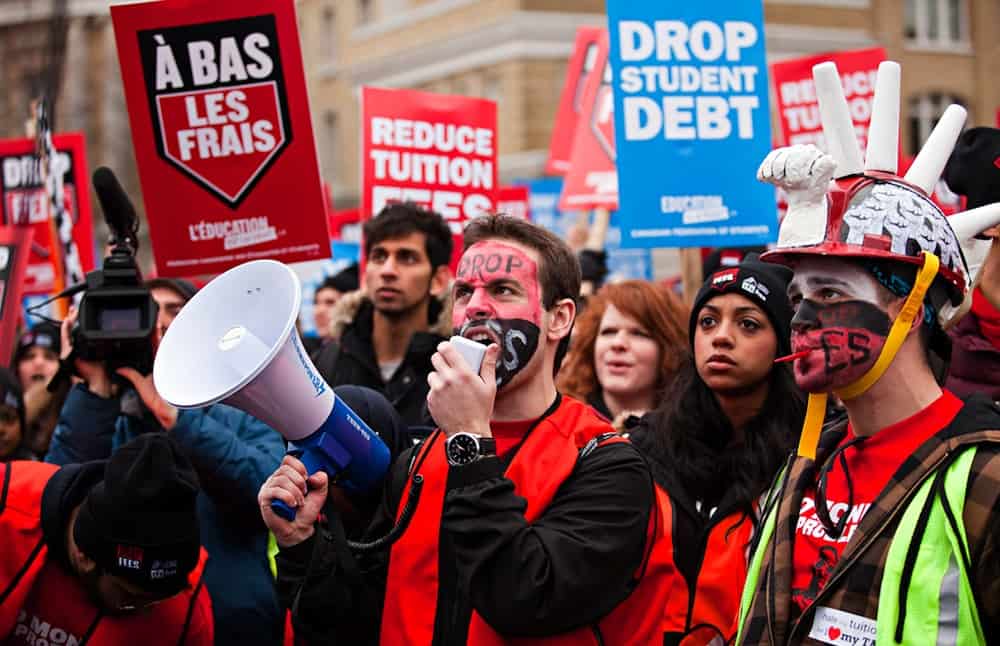Over the past few months in the city of London, UK, hundreds of students have been taking to the streets to protest the forced closure of the University of London Union — the University of London’s central students’ union.
Throughout the demonstrations, the students have faced aggression from the authorities, been arrested, and have had their right to protest severely curtailed by the university administration. In contrast, when it comes to mobilizing against cuts to university education in Ontario, the situation is dismal. The now-defunct annual protest to “drop fees,” organized by the Canadian Federation of Students (CFS), could only ever muster luke-warm support, while students certainly don’t like paying high fees, there is little enthusiasm to do anything about it.
One doesn’t have to go far to see student mobilization in action. In 2012, Quebecois students went on strike in response to a proposed tuition fee increase of 75 per cent. Student activists across the province have posed the question of why Ontario students can’t replicate Québec’s results. The finger is often pointed towards the apathetic masses of students, who do not take part in the work towards affordable education — either consciously or out of ignorance. And so organizers spend most of their time during the year appealing to students through rhetoric and buzzwords to encourage action and involvement.
While this sense of apathy does exisit to a certain extent, with respect to mobilizing for education, students are far from being disengaged members of society. Both inside and outside the classroom, many students are actively involved in issues they care about — whether the issue is tackling the stigma around HIV/AIDS, or examining the effect municipal policies have on the city’s working class; students are involved. The problem does not lie with students, but with the student organizers. We are asking the wrong questions. Rather than assuming students are as apathetic as we think they are, we should be asking how we came to that conclusion in the first place.
The answer is simple: while well-versed in activist ideology and rhetoric student organizers in Ontario, including myself, all fail to listen to their fellow students. We get so lost in talking and reading about organization that we fail to stop and give students the chance to participate in the movement. It is not a case of merely forgetting; when students try to participate in the process and present alternative ideas, they are either shunned, or treated with hostility. Often those who dissent, regardless of political affiliation, are referred to as right-wingers bent on pursuing a campaign of union-busting. It is true that there are political parties that do try to undermine the work of student unions, but, for the most part, the threat is exaggerated.
While claiming to speak for students, organizers continue to maintain a condescending attitude that gives the impression that they know the best practices to guide the student movement, and that the student body is too ignorant to contribute effectively. The status quo of ignoring voices in student movements needs to change. We need to radically rethink how we organize ourselves on campus. We may not agree with all the ideas presented to us, but we need to attempt to include as many voices as we can. Theory is important, but without the involvement of students, it is meaningless.
In addition to listening to students, we need to restructure our systems of participatory democracy to ensure students have more of a say more often. One such model exists in the direct democracy model, applied in general assemblies of the Québec student movement and the Occupy Wall Street protests. Direct democracy allows people to vote on specific policies, as opposed to leaving all of the decisions to a representative executive. Organizers in Ontario have rejected the model, suggesting that such a structure would disenfranchise minority voices. However, as Occupy has successfully demonstrated, direct democracy can be put into place with controls to ensure that minority voices are adequately represented.
If we do not take these steps, students will continue to be disenfranchised, organizers will continue to boast about victories, and tuition fees will continue to increase.
Abdullah Shihipar is a third-year student and an Arts & Science Students’ Union execuitve. The views expressed here are his own.


